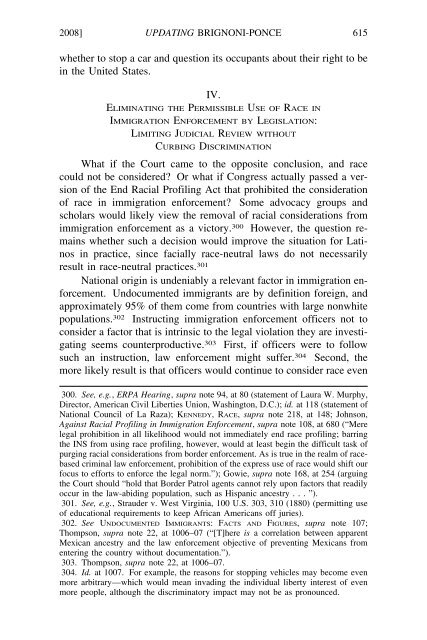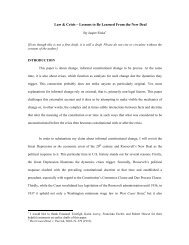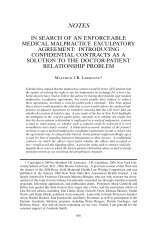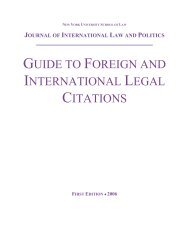updating brignoni-ponce - New York University School of Law
updating brignoni-ponce - New York University School of Law
updating brignoni-ponce - New York University School of Law
You also want an ePaper? Increase the reach of your titles
YUMPU automatically turns print PDFs into web optimized ePapers that Google loves.
2008] UPDATING BRIGNONI-PONCE 615<br />
whether to stop a car and question its occupants about their right to be<br />
in the United States.<br />
IV.<br />
ELIMINATING THE PERMISSIBLE USE OF RACE IN<br />
IMMIGRATION ENFORCEMENT BY LEGISLATION:<br />
LIMITING JUDICIAL REVIEW WITHOUT<br />
CURBING DISCRIMINATION<br />
What if the Court came to the opposite conclusion, and race<br />
could not be considered? Or what if Congress actually passed a version<br />
<strong>of</strong> the End Racial Pr<strong>of</strong>iling Act that prohibited the consideration<br />
<strong>of</strong> race in immigration enforcement? Some advocacy groups and<br />
scholars would likely view the removal <strong>of</strong> racial considerations from<br />
immigration enforcement as a victory. 300 However, the question remains<br />
whether such a decision would improve the situation for Latinos<br />
in practice, since facially race-neutral laws do not necessarily<br />
result in race-neutral practices. 301<br />
National origin is undeniably a relevant factor in immigration enforcement.<br />
Undocumented immigrants are by definition foreign, and<br />
approximately 95% <strong>of</strong> them come from countries with large nonwhite<br />
populations. 302 Instructing immigration enforcement <strong>of</strong>ficers not to<br />
consider a factor that is intrinsic to the legal violation they are investigating<br />
seems counterproductive. 303 First, if <strong>of</strong>ficers were to follow<br />
such an instruction, law enforcement might suffer. 304 Second, the<br />
more likely result is that <strong>of</strong>ficers would continue to consider race even<br />
300. See, e.g., ERPA Hearing, supra note 94, at 80 (statement <strong>of</strong> Laura W. Murphy, R<br />
Director, American Civil Liberties Union, Washington, D.C.); id. at 118 (statement <strong>of</strong><br />
National Council <strong>of</strong> La Raza); KENNEDY, RACE, supra note 218, at 148; Johnson, R<br />
Against Racial Pr<strong>of</strong>iling in Immigration Enforcement, supra note 108, at 680 (“Mere R<br />
legal prohibition in all likelihood would not immediately end race pr<strong>of</strong>iling; barring<br />
the INS from using race pr<strong>of</strong>iling, however, would at least begin the difficult task <strong>of</strong><br />
purging racial considerations from border enforcement. As is true in the realm <strong>of</strong> racebased<br />
criminal law enforcement, prohibition <strong>of</strong> the express use <strong>of</strong> race would shift our<br />
focus to efforts to enforce the legal norm.”); Gowie, supra note 168, at 254 (arguing R<br />
the Court should “hold that Border Patrol agents cannot rely upon factors that readily<br />
occur in the law-abiding population, such as Hispanic ancestry . . . ”).<br />
301. See, e.g., Strauder v. West Virginia, 100 U.S. 303, 310 (1880) (permitting use<br />
<strong>of</strong> educational requirements to keep African Americans <strong>of</strong>f juries).<br />
302. See UNDOCUMENTED IMMIGRANTS: FACTS AND FIGURES, supra note 107; R<br />
Thompson, supra note 22, at 1006–07 (“[T]here is a correlation between apparent R<br />
Mexican ancestry and the law enforcement objective <strong>of</strong> preventing Mexicans from<br />
entering the country without documentation.”).<br />
303. Thompson, supra note 22, at 1006–07. R<br />
304. Id. at 1007. For example, the reasons for stopping vehicles may become even<br />
more arbitrary—which would mean invading the individual liberty interest <strong>of</strong> even<br />
more people, although the discriminatory impact may not be as pronounced.
















